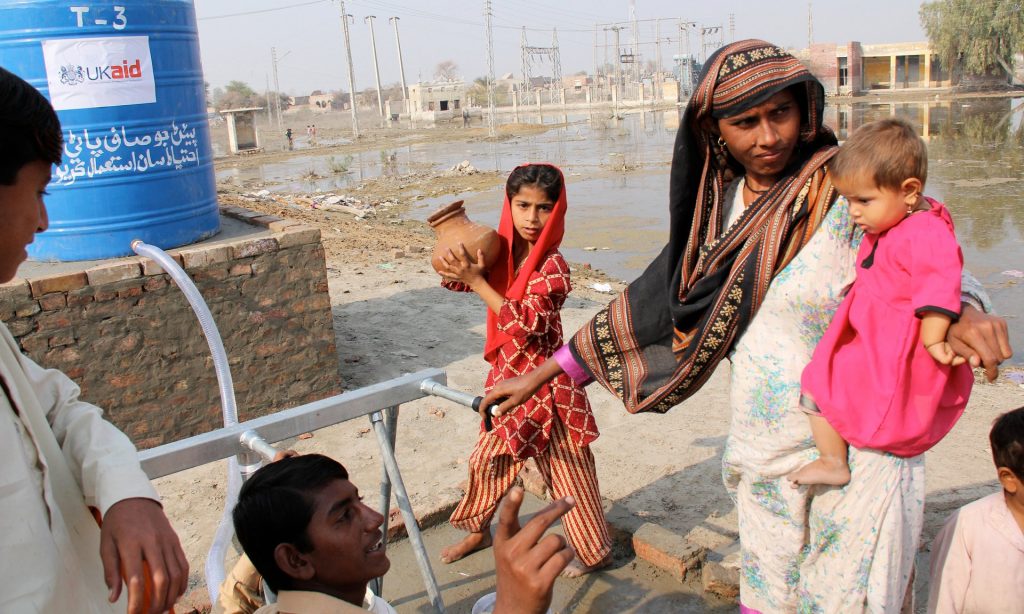The UK has brought water, sanitation and hygiene improvements to almost 63 million people in poorer countries over the past few years, but its aid programmes still need to be more sustainable, targeted and detailed, according to the independent aid watchdog.
In a new report, the Independent Commission for Aid Impact (Icai) says the Department for International Development (DfID) has made a “significant contribution” to extending global access to water, sanitation and hygiene, noting that DfID managed to exceed its target of reaching 60 million people through its programmes between 2011 and 2015.
The commission says DfID’s claims to have reached 62.9 million people are based on sound evidence, and awards the department its second best rating of green/amber for a “relatively good achievement on impact and results management, but weaker performance on sustainability”.
The review – Assessing DfID’s results in water, sanitation and hygiene – finds that not enough is being done to make sure the gains become a “permanent part of people’s lives” because the department’s programmes typically last no longer than three to five years.
The assessment calls on DfID to address the long-term problems that thwart access for millions of people, such as water insecurity, poor infrastructure maintenance, weak local institutions and bad hygiene practices.
The commission also expresses concerns over DfID’s efforts to monitor the impact of its aid and, more broadly, whether the department represents value for money. Although the department spent £698m from 2010 to 2014 on clean water, toilets, handwashing facilities and programmes to encourage better hygiene behaviour, it does not routinely collect impact data.
While such investments are thought to have helped reduce infant diarrhoea, parasitic worms and other infectious diseases – as well as yielding school attendance improvements and reducing gender inequality by cutting the time women spending fetching water – Icai said it was hard to build up a bigger picture.
“While such results may be occurring across the portfolio, we cannot reach conclusions as to where and to what extent,” says the report. “This in turn makes it difficult to conclude that DfID is doing all it can to maximise impact.”
The commission urges the department to collect data to improve its results and help it better target those who most need its help.
Richard Gledhill, lead Icai commissioner for the review, said that while DfID should be justifiably proud to have reached so many millions, it was worrying that the department wasn’t doing more to bring about lasting change.
“DfID also needs to improve how it monitors value for money and the impact of its programmes,” he said.
“And although it is already working in the poorest and hardest-to-reach communities, the new commitment to ‘leave no one behind’ in the global goals means it will also need to target women and girls, the elderly, and people with disabilities within these communities.”
DfID said it was collecting data on the number of women and girls who have access to water, sanitation and hygiene, and the extent to which UK aid helps vulnerable groups access it. The department also said all its programmes in the area were intended to build sustainable local and national systems, and that it was committed to ensuring value for money in all its work.
A DfID spokeswoman said: “As this report confirms, 60 million of the world’s poorest people now have access to clean water and sanitation thanks to British aid. We should be proud of this achievement, which is firmly in the UK’s interest.
“We will now build on this success by helping a further 60 million people by 2020.”
Barbara Frost, chief executive of WaterAid, said the report highlighted the need for clean water, proper toilets and good hygiene.
“Some 315,000 children under five die each year from diarrhoea linked to dirty water and poor sanitation,” she added. “Safe water and sanitation are human rights and, along with hygiene, they improve health and productivity, help keep girls in school, and can save the lives of new mothers and their newborns who might otherwise die of infections from being born in an unhygienic environment.”

